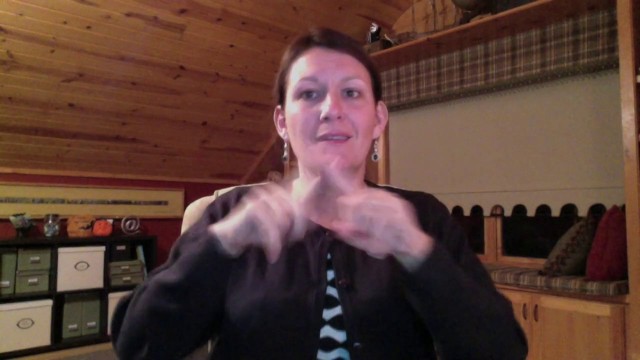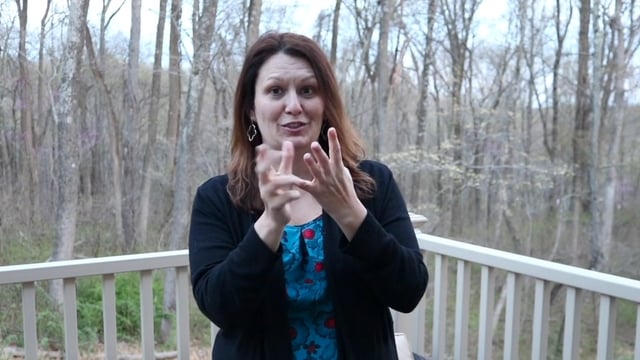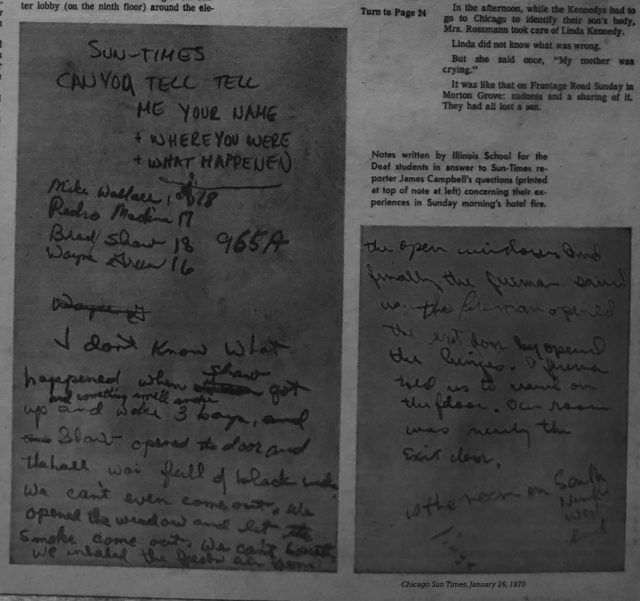My older two kids tried soccer for the first time this year. Coach Bob was an extremely patient guy who worked the large group of kids aged 4-7. My kids were new to the sport, so they required more coaching than others. We had a volunteer signer, and practices were held three times a week for a month.
After the very last practice, my children gave Coach Bob a handmade card. He was visibly touched, but what struck me was how they were the only ones to do this. I didn’t see any of the other families thank him, although they may have and I didn’t see it. I found it hard to believe that this coach, who volunteered his time at the end of what probably were long days for him (he works as a school bus driver) and was so patient with very energetic children, received so little gratitude.
This made me think about how we have regulated gratitude. We have a designated day to show appreciation for pretty much every thing—like the recent Interpreter Appreciation Day (who thought that up, anyway?). There’s Bosses Day, Secretary Day, Teacher Appreciation Day, and Thank a Mailman Day. Let’s not forget Mother’s Day, Father’s Day, Grandparents’ Day, Sweetest Day, and so on.
As the mother of four children, I always feel weird on Mother’s Day. My children already show their appreciation of me in so many ways, as does my husband; I don’t need a day when they feel obligated to give me gifts. They give me love every day, and that’s all I need. But I’m not going to rant about consumerism and how these are profit-making events. The point here is that I prefer to express gratitude freely, and because it’s the right thing to do.
On a separate, but related, note: At a birthday party, I saw two mothers talk about how the birthday child had included thank-you notes in each attendee’s bag. The child had painstakingly handwritten each note. The mothers, who didn’t realize I saw them, laughed at the silliness of the notes.
One said, “I would never let my child do that. I don’t care about people sending me thank-you notes.” The other responded, laughing, “Me, either! I don’t have the time!”
I felt so bad for the birthday child, who had seen their entire conversation. I quickly went over to her to praise her hard work in writing these notes, and she beamed. Later, as I helped clean up, I found one of the thank-you notes, still in its envelope, discarded on the floor. It was addressed to one of the children whose mother had laughed it off. I scooped it up and put it away so the child wouldn’t see it. Rather than receiving gratitude from a child who wanted to express it, they chose to mock the gratitude.
Last week, I inquired after a colleague’s family; she had lost her mother the year before. It was a simple, brief conversation and I told her I had been thinking about her family. The next day, she gave me flowers, much to my surprise. I asked what they were for. “Because you asked about my mother,” she said.
Her message was clear—most people had forgotten about her mother’s anniversary. And that saddened me. I started to tell her it wasn’t necessary—but then stopped myself. She wanted to express gratitude. Building and maintaining relationships means taking care of each other, asking about each other, and most important of all, expressing gratitude freely by choice. And we should receive gratitude with the same level of appreciation, instead of mocking it.
Small acts of gratitude mean more to me than appreciation days. Maybe others prefer to have a blanket appreciation event, especially those who don’t get recognized on an individual basis. That’s perfectly understandable, of course.
Today, maybe take time out to thank someone for something, even if it’s just for being a nice person. Express your gratitude in person. Write an email. Give credit on Facebook or Twitter for something someone did. It doesn’t have to be much, nor does it have to be public or forced. Simply make that person feel appreciated. Chances are the person will remember this effort far longer than any Hallmark-endorsed appreciation day.
Copyrighted material, used by permission. This article can not be copied, reproduced, or redistributed without the written consent of the author.






Hello Trudy,
Thank you for taking the time to remind us the value of appreciation and gratitude. It seems like a lost art these days. I remember my mother always tell me “what do you say?” whenever I receive something nice from someone, may it be a gift or gesture of help. “Thank you!”
Shane
I agree 100%. We need to appreicate of others more often even alittle or big. Thanks for this article and video.
Dear Trudy,
We haven’t yet met, however I have come across your name or even some vlogs. This vlog is very powerful and very true~ I have always made it a rule to myself, always be grateful to everyone regardless if they were rude. Always say thank you. When kids grow up, I usually made tons of goodies for everyone. I was touched when I gave a plate full of goodies to a sewer person who picks up our garbage on a weekly basis, he looked so shocked. I just smiled and signed, “Thank You!” knowing I had just made his day~
As for Mother’s Day, funny because my kids know I always feel weird on Mother’s Day. I don’t want them to feel obligated for any reason. I would love and prefer for them to be grateful on a daily basis. I am grateful for you taking time to make this powerful vlog. Thank you, Trudy and look forward to meeting you one day~
Your vlog is very impressive and I like your comments. Thank you for sharing.
LindaT
Trudy,
This is what we need more of….gratitude and a concern for each other. I’m glad you were there to encourage that little girl and let her know that her act of kindness does not go unnoticed or is discarded by everyone. Shame on those mothers who have discarded the simple act of showing appreciation for others’ thoughtfulness.
Trudy
THANK YOU!! for a wonderfully expressed and very relevant article. May I share this on my FaceBook page? I think everyone should be seeing this!
Carol-lee
I watched on your Giving and Receiving Gratitude, You have very good heart and thinking with people. I know same thing to me what I feeling did happened to me what I seen other people. Last Summer, Ours Softball team I am assist’s coach and I noticed that after season over and Most of players came to gave a note and in person saying Thanks for all through season and two of girls wrote a note like P.S. Sorry for I dont know how sign lang, Hope I will learn sign lang for next year. My mind not need to push they get learn sign lang. How I saying two of girls, I make them understand what I did use gesture and sometime homemade sign during the games. I stilling understand what they said .. You know what I mean. I stilling appreciation what they said to me. During school , I went to dropped off ours kids at classroom, some players ran to me saying hi, I use gesture them and they happy to see me..
Carol, of course! :) Thanks so much.
Jeff–yes, It’s the thought that counts, for sure.
Everyone else–glad you liked the article. It’s definitely something I have to remind myself of–to express and receive gratitude without too much fuss, yet embracing it. Easier said than done some days. :)
Trudy –
Thank you for your sweet express & thought-provoking about giving & receiving gratitude. Nice way to remind people. I *handwaving* you for that.
.k.
Trudy,
I wholeheartedly agree with you! While it’s easy – and important – to express appreciation toward others, it’s not always easy to remember to do so! Thanks for the heartfelt reminder. :)
(Imagine how much happier the world would be if each person did this just once each day!)
My wife and I taught our daughters, since they were little, to always write and mail a thank you card as a time-honored way of showing appreciation for anything, even only a $5 donation to their fund-raising event. So often, we got many interesting comments from others who received thank you notes from our kids that they never received from others, so to sum it up, we saw how thank you messages (be it a written note, an email or even a phone or VP call) meant a lot to them.
Every child should learn this skill as a part of their upbringing. Trudy, you did absolutely right thing, no question about it.
Hi again, Trudy! :)
I think you’ll like this:
http://cshwellbeingblog.com/2013/11/03/on-gratitude-and-giving-back/
The art of gratitude has been, thankfully revisited…again. Loved your posting and FYI, rest assured that there were no holes in knee of my jeans. ;-) Thank you for having your point gently made here. I heart this.
One tip I learned about receiving gratitude; show appreciation no matter how it is unimportant this gratitude is. This person who put thought and made effort to give their thanks. They kind of want some validation on their action.
I agree gratitude is very important. Although, I am awkward when I receive gratitude. So, I learn to recognize gratitude and express a warm gesture in return.
I used to be this “oh, ok. You are welcome.” Now, I learn how to say it although it may come a bit inauthentic. “Oh, this is nice of you doing this. I you recognize this that no one else see it. It mean to me. It make my day.”
To this day I still have difficult receiving gratitude. Maybe I don’t like be in the limelight. Or, I am being modest. But, I remind myself it is person that recognize my thoughts and my response that have an impact. Thus, I settle for the greater good.
I fully agree with you, my motto is ” one should love or appreciate during 365 days per years”. And these special days are all money makings, I also tell my kids that I do not need gifts but want their love and appreciation 365 days. A small token of appreciation does make a difference in a person, anyway I am from South Africa!